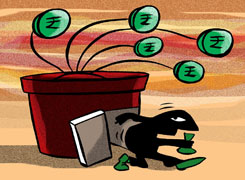I Have following mutual fund Canara Robeco Flexi Cap Fund Growth, Canara Robeco Large and Mid Cap Regular Growth, Mirae Asset Large Cap Fund Regular Growth, Aditya Birla Sun Life Small Cap Fund Growth, HDFC MNC Fund Regular Growth & Aditay Birla small cap fund Regular Growth. Rs 100000/- was invested in each of fund. should I sold this fund and reinvest is new fund or continue in same fund
Ans: You have built a good foundation with reputed fund houses. Investing Rs 1,00,000 each in these funds shows your interest in growing wealth through equities. You have already taken the right step by selecting diversified categories such as flexi cap, large and mid cap, large cap, small cap, and thematic MNC funds. Let us now assess them carefully and decide if any changes are needed.
» Portfolio Appreciation
Your mutual fund selection is strong in quality. You have chosen established fund houses with good track records. These funds are known for consistency and transparency. This shows your research and smart thinking. You already hold a balanced mix of different fund categories. That is an excellent start.
However, there is some overlap and scope for refinement. A few small adjustments will make your portfolio sharper and more effective for long-term growth.
» Fund Category Review
Your portfolio includes:
– One Flexi Cap Fund
– One Large & Mid Cap Fund
– One Large Cap Fund
– Two Small Cap Funds
– One MNC Fund (Thematic)
This structure gives exposure to all parts of the market, but also brings duplication in some areas. Two small cap funds may create overlap because they both invest in similar types of companies. Small caps are high-risk, high-return funds. Holding two small caps adds extra volatility without adding much diversification.
Having one small cap fund is enough to capture the growth potential of that category. You can continue the one that has shown stable long-term performance and disciplined risk management. The other can be redeemed and reallocated to strengthen core holdings.
Your flexi cap and large & mid cap funds already provide diversified coverage across market segments. These are strong as core holdings because fund managers here can shift between large, mid, and small caps based on market conditions. These two funds can be retained as part of your core equity portfolio.
Your large cap fund adds stability. It invests in top companies that bring steady growth. Keeping this is good for balancing risk.
Your MNC fund is a thematic one. It focuses on multinational companies which usually have strong balance sheets and governance. But thematic funds can underperform during certain cycles. It is fine to hold it in small proportion (around 10–15% of total equity).
» Overlap and Diversification
Too many funds often lead to portfolio overlap. For example, many large and mid cap funds hold similar stocks that also appear in flexi cap or large cap funds. This reduces the real benefit of diversification. Instead of managing six funds, having four well-chosen funds is more efficient. It simplifies monitoring and helps you stay consistent.
You can consider continuing with one flexi cap, one large & mid cap, one large cap, and one small cap fund. This structure gives you exposure to all market segments without duplication.
The MNC fund can be kept only if you wish to maintain a thematic exposure. Otherwise, you can exit it and add more to the existing diversified funds.
» Performance and Holding Period
Before taking any redemption decision, check your holding period. If these investments are less than one year old, redeeming now will attract short-term capital gains tax at 20%. If held for more than one year, the long-term capital gains above Rs 1.25 lakh in a year are taxed at 12.5%. So, plan redemptions carefully to minimise tax.
Also, mutual funds work best when held for long periods. Frequent switching does not help. If your funds have not completed at least 3 years, allow them more time. Good funds can underperform temporarily but perform strongly over longer cycles. Review after 3–4 years before making final decisions.
» Regular vs Direct Plans
If you are investing through regular plans linked with a Certified Financial Planner or mutual fund distributor, it is better to continue that way. Many investors think direct plans give higher returns because of lower cost, but they miss the professional guidance that comes with regular plans.
Regular plans give you ongoing support, portfolio monitoring, rebalancing advice, and behaviour management during volatile markets. These benefits lead to better long-term results than self-managed direct plans.
In direct plans, you must handle all reviews, changes, and documentation yourself. During market volatility, emotional reactions can lead to mistakes like panic selling or chasing returns. A Certified Financial Planner provides discipline, structure, and emotional stability. That value far exceeds the small cost difference.
Hence, continue through your Certified Financial Planner-linked channel. This ensures accountability and better overall performance.
» Market Volatility and Patience
Equity investing requires patience. Markets go through cycles. Sometimes, even good funds may look dull in short periods. Selling too early can harm long-term growth.
If your funds are fundamentally strong and belong to reputed fund houses with experienced managers, continue them. Avoid switching frequently based on short-term returns. Long-term compounding needs stability.
Remember, real wealth in mutual funds builds over time, not by jumping from one fund to another.
» Future Investments and Rebalancing
Going forward, you can channel your fresh investments or SIPs into fewer but stronger funds. Focus more on core categories like flexi cap and large & mid cap. Keep small cap allocation around 15–20% of total equity exposure.
Review the performance once every year. Remove consistent underperformers if they lag for over 3 years compared to their category average. Avoid frequent changes based on temporary movements.
If your goal horizon is less than 5 years, start gradually shifting that part of your corpus to debt funds. If your goals are long-term, continue with equity allocation.
Also, once every year, rebalance your portfolio if one category grows too much. For example, if small caps outperform, reduce slightly and shift gains to large caps or flexi caps. This keeps risk and return in balance.
» Tax Efficiency
Be aware of taxation while switching. The new rule states:
– Long-term capital gains above Rs 1.25 lakh a year are taxed at 12.5%.
– Short-term gains are taxed at 20%.
To minimise tax, you can stagger your redemptions over two financial years if gains are large. Also, reinvest redeemed money immediately into suitable funds to maintain compounding.
» Role of Certified Financial Planner
A Certified Financial Planner not only suggests funds but also aligns them to your goals. This ensures each rupee invested works towards a clear purpose. A planner tracks your progress, reviews annually, and helps in rebalancing.
They also protect you from emotional investing mistakes. When markets rise or fall sharply, investors often make hasty decisions. Having a Certified Financial Planner ensures your portfolio stays disciplined and aligned.
Hence, rather than changing funds on your own, consult your Certified Financial Planner before switching. Their experience and data-driven analysis will help in deciding which funds to retain or exit.
» Practical Next Steps
– Keep 4–5 funds maximum. Too many reduce clarity.
– Retain one small cap, not both.
– Retain one flexi cap, one large & mid cap, one large cap.
– Keep MNC fund only if you want limited thematic exposure.
– Avoid frequent switches. Give funds at least 3–4 years.
– Use regular plans via Certified Financial Planner for guidance.
– Rebalance annually based on risk and goals.
– Plan redemptions considering tax rules.
This structure will give you a clean, manageable, and growth-oriented portfolio.
» Finally
Your fund selection already shows good thought and awareness. You are investing in quality funds across categories. The main improvement needed is simplification and proper proportioning.
Continue with core diversified funds, reduce duplication, and give them time to perform. Avoid chasing new funds or switching for short-term trends. With patience, consistency, and professional review, your portfolio can deliver strong long-term results.
Stay invested, stay disciplined, and let compounding do its work quietly.
Best Regards,
K. Ramalingam, MBA, CFP,
Chief Financial Planner,
www.holisticinvestment.in
https://www.youtube.com/@HolisticInvestment


























